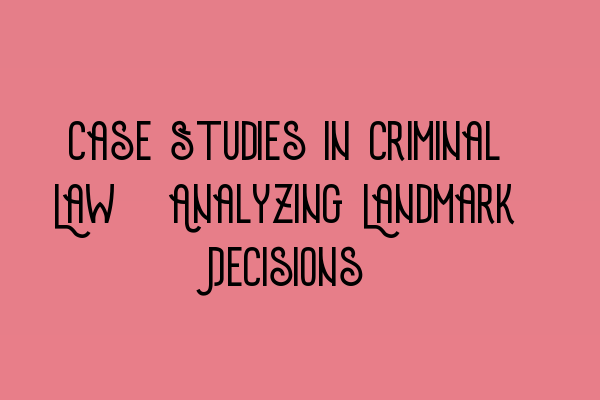Case Studies in Criminal Law: Analyzing Landmark Decisions
As criminal law practitioners, it is essential to study and understand landmark decisions that have shaped the legal landscape. These cases not only provide valuable insights into the interpretation and application of criminal law principles but also serve as precedents for future legal arguments.
In this blog post, we will delve into some fascinating case studies in criminal law, analyzing the key decisions and their impact on the legal framework.
The McPherson Murder Case
The McPherson murder case remains a groundbreaking example of how forensic evidence can be instrumental in solving crimes. John McPherson was accused of brutally murdering his wife, Sarah, in their family home. The prosecution relied heavily on DNA evidence found at the crime scene, which ultimately led to McPherson’s conviction.
Examining this case allows us to explore the complex interplay between evidence and the burden of proof in criminal proceedings. It also highlights the significance of expert testimony and the need for robust forensic investigation techniques.
If you are preparing for the SQE 1 exam, make sure to check out our SQE 1 Practice Exam Questions to test your knowledge on criminal law principles and legal reasoning.
The R v. Parker Drug Trafficking Case
One landmark decision that significantly shaped drug trafficking laws in the UK is the R v. Parker case. Daniel Parker was charged with possession and intent to supply a substantial quantity of illegal drugs. The key issue in this case revolved around the admissibility of evidence obtained through an unlawfully obtained search warrant.
Through a meticulous analysis of this case, we can explore the concept of legal rights and the protection against unreasonable searches and seizures. This case emphasizes the need for adherence to strict procedural requirements in criminal investigations and the potential consequences of breaching constitutional rights.
If you want to enhance your understanding of criminal law principles and familiarize yourself with similar case studies, consider enrolling in our comprehensive SQE 2 Preparation Courses.
The R v. Smith Manslaughter Case
The R v. Smith manslaughter case presents a thought-provoking scenario that explores the boundaries of self-defense in criminal law. In this case, John Smith was accused of manslaughter after fatally injuring an intruder who broke into his home. The central question was whether Smith’s actions were proportionate to the threat he faced.
By closely examining this case, we gain insights into the elements of self-defense, including the reasonable belief of imminent harm and the principle of proportionality. It prompts us to reflect on the delicate balance between protecting oneself and using excessive force.
If you are preparing for the SQE 1 exam and looking for additional resources, take advantage of our SQE 1 Practice Mocks FLK1 FLK2 to sharpen your legal analysis and problem-solving skills.
The R v. Johnson Fraud Case
The R v. Johnson fraud case exemplifies the complexities surrounding white-collar crimes. Thomas Johnson, a prominent businessman, was charged with orchestrating a large-scale Ponzi scheme. This case raises important issues such as the elements of fraud, the reliance on false representations, and the consequences of financial deception.
Studying this case enables us to gain a deeper understanding of the legal requirements for establishing fraud and the challenges involved in bringing white-collar criminals to justice. It also emphasizes the need for effective regulatory measures to prevent such fraudulent activities.
If you are interested in pursuing a career as a criminal law solicitor and want to prepare for the SQE exams, make sure to explore our comprehensive SQE 1 Preparation Courses tailored to equip you with the knowledge and skills necessary to excel in your professional journey.
For the latest SRA SQE exam dates and important updates, visit our page on SRA SQE Exam Dates.
By delving into these case studies, aspiring criminal law practitioners can sharpen their analytical skills, gain a deeper understanding of legal principles, and develop valuable insights that will benefit them throughout their careers.
At SQE Criminal Law & Practice Law UK, we are committed to providing comprehensive and effective preparation for the SQE exams. Explore our range of preparatory courses and resources to ensure you are well-equipped to succeed in the field of criminal law.
